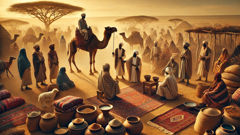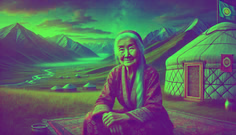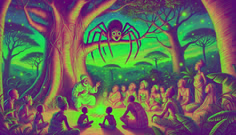Introduction
Across the sun-pinned plains and stony coasts of the Horn of Africa, a thousand stories move by foot and by mouth—woven into the long cloth of dawn and dusk. Among them stands the figure of Wiil Waal, the wise and wily Sultan whose name carries like a song from well to well, from caravan to coastal market. He is not merely a judge who pronounces law; he is a storyteller, a riddle-master, and a living mirror held up to the heart of his people. In these tales, disputes are not solved by force or by the slow grind of distant courts but by a court where wit is its own authority. The people come to Wiil Waal with thorny questions: who owns the camel that both neighbors claim, which of two brothers should inherit a blade worn by three generations, whether a stranger in the night speaks truth or deceit. The Sultan listens like a dry riverbed catching rain—patient, deliberate—then sets a test shaped like a puzzle or a parable. By listening, watching, and answering, the community shows itself; by answering wrongly, it reveals pride, greed, or petty malice. When it answers rightly, it shows compassion, cleverness, and the wisdom that keeps a people together. These stories, retold and reshaped by griots and grandmothers, by shepherds around low campfires and by merchants in the shade of acacia trees, preserve a living law: that wisdom must be tended like a garden, that laughter can cut sharper than steel, and that a well-chosen riddle can reveal what a thousand speeches cannot. What follows is a collection of those moments—fables of cunning and justice, riddles that sting and delight, and the quiet lessons Wiil Waal taught to a nation who needed reasoning as much as rain.
The Sultan's Court: Riddles, Judgments, and the Camel's Shadow
Wiil Waal’s court was not a marble hall with columns and heralds; it was a circle of rugs and low stools beneath a sky that remembered everything. The court sat in the center of the town, where the bazaar funneled into narrow lanes and where the sea breeze mixed with the dusty scent of tea and myrrh. When a dispute arrived, it came like a small storm: neighbors with sharpened words, kinships frayed by slights, merchants whose ledgers insisted they were right. The Sultan loved nothing more than a problem that needed careful hearing and a riddle that would tease out what men and women hid inside themselves.

Once a merchant and a shepherd came to Wiil Waal, both claiming ownership of a single camel. The shepherd maintained it had strayed into his fold and eaten his only seedling, while the merchant swore it had been bought in a distant market and certified by witnesses. Each presented a fragment of truth and a wedge of falsehood. Wiil Waal listened, then asked them to bring the camel into his courtyard. When the camel arrived, the Sultan took a length of rope and tied a small bell to its neck. "When the bell rings," he said, "the camel will be heard. If it answers when you call in the voice of the desert, we will know its home." The two men were puzzled, but they did as he directed. Wiil Waal then called for a night to pass. He returned at dawn with two bowls: one filled with spiced water and the other with barley. "Let the camel choose," he said.
When the camel stepped forward, it ignored the bowls and walked to the merchant, nuzzling his hand. The shepherd frowned, certain of deceit, but Wiil Waal only smiled and asked a further question in a tone like wind across dunes. "How long has each of you walked with your goods across the desert? Who has fed travelers in the night?" The merchant, caught by unexpected inquiry, confessed that he had once bought the camel but traded it away in a fit of debt, then reclaimed it later by bribing witnesses. The shepherd spoke of nights of guarding, of dividers in the sand that mark the difference between a friend and a thief. Wiil Waal declared the camel for the shepherd and fined the merchant—not as punishment alone, but as a lesson that witness without character is a brittle thing. The court returned home with more than a solved dispute: they brought back a sense of moral order restored by a riddle of belonging and the animal's own behavior.
In another story, two women argued over a single necklace: one said it had been a wedding gift from her mother; the other claimed it had been found by a child in the market. There were tears and the murmuring of kin who already chose sides. Wiil Waal examined the necklace. It was a band of beaten silver etched with a small crescent and a faint pattern, dulled by time. "Beauty has many hands," he said softly, "and metal remembers the palms that own it." He asked the women to tell him the story of every time they had worn the necklace—where they walked with it, who touched it. At first they recited polished phrases, but when Wiil Waal asked them to sing the lullaby their mothers had sung while they wore it, one woman became silent. She couldn't remember the lullaby because she had never slept in a grandmother's compound. The other hummed under her breath a line about the sea and a mother's thumb against a child's forehead.
The Sultan asked them to wear the necklace again and to walk along the edge of the marketplace. The woman who hummed the lullaby paused at an old stall where a sailor pressed a coin into her palm for luck; he stopped and blessed her with an old sailor's phrase that her mother had once used. The necklace warmed against her throat as if remembering. Wiil Waal spoke: "Some things are kept by memory as much as by hand. The heart beats with ownership sometimes before the law can put ink to paper." He returned the necklace to the woman whose hum the market and the sailor's blessing confirmed as belonging to a line of working women who had kept the sea's talismans.
Wiil Waal's riddles were rarely simple puzzles divorced from people's lives. They were shaped around habit and history: a test that asked not only for cleverness but for the kind of character that sustains a community. He might pose a riddle about a river that flows both ways to judge a trader's sense of fairness, or about a hen that laid stones to ask a father whether he would sacrifice pride for the safety of his child. When an elder answered with patience rather than pride, Wiil Waal often nodded and let the matter rest. When a man answered with stubborn insistence, the Sultan's follow-up would reveal how that stubbornness harmed others.
People learned that the Sultan's tests were reflective. If you came with greed, you would likely be unmasked by your silliest boast. If you came with humility, you might be granted mercy and guidance. Wiil Waal's chief minister once described him as a net—something that catches not only fish but whatever else the sea throws up. The court itself became a school, where a disputant could leave chastened or enlightened, and where alliances were repaired and sometimes dissolved. Those who loved Wiil Waal said he had a laugh that could melt tension; those who feared him said his silence was colder than a winter well. Yet in every tale the outcome served the village: property returned, grudges thawed, and a sense that law was not merely a list of punishments but a living conversation.
Beyond formal cases, Wiil Waal loved to challenge his people publicly with riddles that doubled as moral prompts. On market days, he might shout a riddle from his dais and reward the first correct answer with a bowl of sweet rice or a small coin. Children memorized these riddles and delighted in answering them at dusk. One favorite went like this: "I go before you, I chase you back, I tremble in the wind and keep your door from attack. What am I?" Answers ranged from the moon to a brave dog, but Wiil Waal would smile kindly and reveal the answer—'shadow'—and then explain how the shadow, like a true neighbor, follows without asking for pay. The riddle taught more than a clever trick: it taught the joy of modest service and the quiet presence of one's duties.
The Sultan also used stories to expose hypocrisy. A wealthy landlord came to Wiil Waal claiming he was owed tribute by a poor widow. He presented receipts and a chorus of witnesses, but Wiil Waal asked the widow to bring her cooking pot. When the pot arrived, Wiil Waal inspected its blackened bottom and asked whether the landlord had ever tasted food from it. He then invited the landlord to cook a small meal in the widow's pot. The landlord refused indignantly, for his hands were used only to sign papers and taste specialty tea. Wiil Waal asked the widow to prepare a simple stew and to invite the landlord to share. The landlord declined, and in refusing to share food, he had revealed the very separation of heart and deed that invalidated his claim. The crowd murmured, and Wiil Waal declared the widow free of debt. The lesson was plain: some evidence lies inside gestures, not on paper.
For all his puzzles, Wiil Waal never mocked those who failed. He often turned a wrong answer into a treatise on better living: patience instead of pride, consultation instead of concealment, listening instead of shouting. If a youth was caught lying to win a riddle, the Sultan would send him to the market to fetch water and to tend the Sultan's goats for a month, saying the lesson of labor teaches truth more effectively than the lash. The youth returned, sweat-worn and steadier, with a new understanding of the value of honesty. In this way, Wiil Waal's court was practical as well as poetic: judgments came with gentle rehabilitation.
Stories of the Sultan's fairness spread beyond the town. Travelers carried them along caravan routes, changing details but keeping the core: that a king who rules with the people's wit, who uses riddles to pry open stubborn hearts, is a king who saves a nation from itself. And they kept his laughter, the bell of his humor, and the hush that fell when he chose to speak long and slow. In times of drought and in times of feast, people remembered that justice, like water, must be shared. Wiil Waal, through riddles and quiet justice, became the people’s mirror, the one who could name what's hidden and show how it might be made right.
Even those who were not always satisfied with the Sultan were forced to admire his methods because they worked. Feuds that might have become blood were tempered into salted apologies and returned goods; months of vendetta were ended by a single riddle that revealed the pettiness of the original quarrel. And so the legend of Wiil Waal grew, embroidered by storytellers who loved the idea of a ruler who could teach with a question and heal with a parable. He became, in story and in practice, a bridge between law and laughter: a sovereign who understood that wisdom often arrives dressed as a puzzle and stays by the warmth it leaves in those willing to learn.
Wit Across the Dunes: Travelers, Tests, and Lessons in the Night
Beyond the formal trials, the roads and dunes that connected towns carried smaller, intimate tales of the Sultan's curiosity and mercy. Travelers stopping to barter might find themselves challenged by Wiil Waal not in law but in character. Once a caravan came with a clever trader who boasted of his wares and had a sharp tongue to match. He claimed to bring not just spices but a secret method to fold cloth that made selling easier and profit greater. The trader was bright and quick, and he loved to be admired. Wiil Waal welcomed him with tea and asked for a demonstration—not of how to make money, but how to fold cloth for the comfort of the poor. "Teach my people to fold a blanket so the aged can carry it without losing their balance," said the Sultan. The trader laughed and folded a silk scarf into an ornate shape that could not keep a load steady. Then the Sultan asked a widow who carried firewood each morning to step forward. He had the trader fold the blanket around a little boy and then asked the widow to lift. The trader watched as the folds slipped and the load became awkward.

Wiil Waal then asked the widow to fold the blanket her own way. She did: not elegant, but secure. The boy rode steadier and the widow walked straighter. The trader's face fell. The Sultan turned to the crowd and said, "Beauty is proud until the wind blows. Practicality carries us through hard days." The trader learned humility; the people learned that the finest folds are those that hold what matters. The lesson spread on the caravan routes: craft that doesn't serve community is only ornament.
On another night, a stranger arrived dripping with rain and mysterious goods. He told of a far-off shore where fish glowed with a faint blue light. The town buzzed with curiosity and suspicion. Wiil Waal welcomed him but asked the stranger a question that had less to do with fish and more to do with honesty: "If you give a gift to a child so their father will owe you, what do you own after the father repays?" The stranger was puzzled, then evasive. The Sultan invited the stranger to sleep in the guest room and watch the children in the morning. At dawn, the stranger was seen slipping sweets into a child's pocket and then whispering promises to the father to watch his loyalty. When exposed, the stranger fled, and Wiil Waal explained gently how manipulation wears quickly compared to earned trust.
Wiil Waal's tests sometimes took the form of parables that stretched over seasons. There was a tale of two brothers who inherited a patch of coastal land: one planted a thorn hedge and guarded the plot obsessively; the other opened his land to fishermen and shared his catch. Years later, a storm came and took what could not be anchored; the brother who had shared found neighbors who helped him after the storm, and he rebuilt; the other brother had taught himself to stand alone and found no hands when the wind took his fence. Wiil Waal told the story to a young man who had been tempted by greed and watched as the youth, hearing the fate of the brothers, turned his chest inward and then outward—choosing generosity. The Sultan's parable had done its work: it had offered a future choice to be lived differently.
A favorite of the children involved a riddle about the stars. Wiil Waal would sit with small ones on his lap and ask, "If you plant kindness like a seed at night, waking to water it at dawn, what does the seed become?" Answers came in a rush: a tree, a feast, a friend. Wiil Waal's answer was always patient: "It becomes a place where the tired can rest."
Riddles also served to integrate newcomers. When a clan from a distant ridge joined the town, Wiil Waal held a public night of riddles. He did not ask about genealogy first; he set outward tests—asks about how one shares water, how one fixes a sandal, what one does when a neighbor's sheep get lost. One young man solved a riddle about sharing the shade of a single umbrella and won both a scroll and the crowd's applause. But more important than prizes was the recognition: to solve the Sultan's riddle was to be seen by the community as someone who understood its rhythms. Thus, the newcomer became one of them not by blood but by demonstrated sensibility.
Not every tale ends in delight. At times Wiil Waal's methods produced sorrow because truth often requires seeing what you have done. An elder who denied his role in betraying a neighbor's trust was made to reenact the sequence of lies before the community, and the shame was sharp but led to restitution. The elder mended fences with the betrayed family and took up the labor of repairing their roof. The story spread as one of complicated mercy: public accountability could heal if combined with meaningful repair.
Wiil Waal also used music and proverbs as a form of gentle pedagogy. While a riddle might prick at conceit, a proverb could be a salve. He would hum a line of clan wisdom and let its rhythm settle, then ask his listeners to speak a proverb back and say what it meant to them. This practice held an important role in the oral tradition: it taught that words are living things and that their meanings shift until we make them steady by speaking them together. In this way, the Sultan preserved language itself, the shared lexicon that bound people across drought and dawn.
A particularly memorable tale described how Wiil Waal tested a group of judges suspected of taking bribes. He announced a festival and asked the judges to choose a hundred lamps from the market to decorate the town. They accepted the funds and returned lamps that were only half as bright as promised. Wiil Waal invited them to light the lamps himself and walked through the streets at night. As he passed each dim lamp, he stopped and asked each judge to tell a true story that had no prize in it. Some could not. One judge, ashamed, told of his daughter's first day at school and how he had waited with her afterward for hours. The warmth of the story seemed to relight the lamp. Wiil Waal turned to the judges and said, "If your light depends on the price you paid, you will always be dark where the poorest stand." The judges repented publicly, returning money or labor to restore the festival lights. The story spread as a reminder that public service requires public heart.
Across dunes and at market crossroads, Wiil Waal's voice remained a subtle law: not a code etched in stone but a way of testing the living. His riddles and tests cultivated a civic imagination in which people learned to see how small acts of measureless generosity could become community insurance against the harshness of the world. The Sultan taught that wisdom travels on small feet: a good answer from a child could be a better seed than a hundred learned books. Travelers left the town with new riddles in their mouths and new ways of thinking in their steps, carrying the Sultan’s lessons into distant valleys. In time, these stories collected like beads on a string, each riddle a bead, each judgment a knot—some bright, some rough—but all part of a necklace that bound the people to one another and to a memory of justice that was human, fallible, and kindly.
Conclusion
The tales of Wiil Waal endure because they are practical poems—action bound to idea, humor bound to justice. These stories teach more than how disputes were settled; they teach a method of living that values listening, creative tests of character, and remedies that heal rather than simply punish. Wiil Waal's legacy is not a single ruling but a pattern: use wit to unmask greed, use parable to teach empathy, and use small, restorative tasks to rebuild what pride has broken. In a world where law can be written on paper but seldom inscribed on the heart, the Sultan's riddles provide a living alternative. They remind us that communities can govern themselves by cultivating wisdom, that everyday acts—sharing water, folding a blanket well, telling the truth—compose the scaffolding of a peaceful society. As these folktales travel again into the modern world, they offer readers a portable ethic and the pleasure of a good riddle. To remember Wiil Waal is to remember a people who survived and loved by talking thoughtfully and laughing often, and to carry forward the practice of asking sharp questions in the service of a softer world.

















